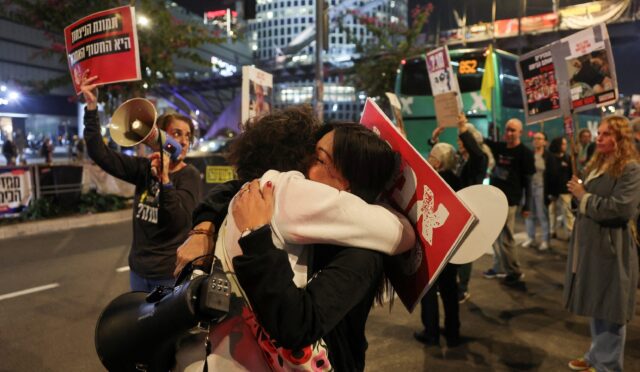Israel Hosts Hostage Exchange Amid Tensions
In a dramatic turn of events, Palestinian militants released three Israeli hostages on Saturday in a significant prisoner exchange deal. This swap involved the release of hundreds of Palestinian inmates by Israel, marking a crucial moment in the ongoing conflict despite rising fears that the fragile truce in Gaza was on the brink of collapse.
The exchange took place in Khan Yunis, where masked Hamas gunmen proudly displayed the hostages before the crowd. The three men, who were seen holding gift bags from their captors, made statements calling for further hostage exchanges as they were handed over to the Red Cross before being returned to Israeli soil.
Emotional Reunions and Celebrations
The release of the hostages brought tears of joy to their families and friends. Sagui Dekel-Chen, Sasha Trupanov, and Yair Horn had been held by militants since the onset of the conflict on October 7, 2023. Trupanov’s family expressed immense relief, stating, “Finally, Sasha can be surrounded by his loved ones and begin a new path,” while Dekel-Chen’s wife shared her emotions live on air, exclaiming, “My breath has returned. He looks so handsome.”
Simultaneously, a bus carrying Palestinian prisoners left Ofer Prison, greeted by cheers from the crowd in Ramallah. This release was part of a larger agreement, with Israel confirming a total of 369 prisoners were freed, including 333 Gazans apprehended during the conflict.
Details of the Prisoner Swap
The latest exchange was the sixth since the ceasefire began on January 19. Tensions have been high, with Hamas threatening to halt further releases due to alleged violations by Israel, while Israel warned of potential military escalation if the hostage releases ceased.
The Palestinian Prisoners’ Club reported that among those released were 36 inmates serving life sentences, with a portion of them set for deportation under the ceasefire terms. Images broadcasted across Israeli media showed the released prisoners in sweatshirts adorned with the prison service logo, emphasizing their struggle and resilience.
Public Reaction and Concerns
In Tel Aviv, crowds gathered to watch live coverage of the exchange, many waving Israeli flags and holding placards that conveyed mixed emotions, such as “Sorry and welcome back” and “Complete the ceasefire.” However, this release also ignited anger and concern, particularly regarding the treatment of the freed hostages and the conditions they endured while in captivity.
Concerns were further amplified as some of the released prisoners were hospitalized following their return, raising questions about the health and treatment of those held in Israeli facilities.
Strain on the Ceasefire Agreement
The ceasefire has come under increasing strain amid geopolitical tensions. The situation escalated when former President Donald Trump proposed relocating the population of Gaza to Egypt or Jordan, a suggestion that was met with fierce opposition from Arab nations.
In response to these developments, Saudi Arabia is hosting a summit with leaders from Egypt, Jordan, Qatar, and the UAE to address the crisis. Additionally, Christian leaders in Jerusalem have issued a statement asserting that Gazans should not be forced into exile.
The Impact of the October 7 Attack
The October 7 attack resulted in a devastating toll, with an AFP tally indicating that 1,211 individuals, mostly civilians, lost their lives. The assault also led to the capture of 251 hostages, leaving 70 still in Gaza, including 35 that the Israeli military claims are deceased.
In light of these grim statistics, Israeli Prime Minister Netanyahu’s office announced ongoing efforts in collaboration with the United States to secure the release of the remaining hostages, though specific details remain undisclosed.
Casualties of the Ongoing Conflict
The retaliatory actions taken by Israel have resulted in catastrophic losses in Gaza, with at least 48,264 people reported dead, the majority of whom are civilians. These figures, sourced from the health ministry in the Hamas-controlled territory, have been deemed reliable by the United Nations.
The ongoing conflict continues to draw international attention, with humanitarian concerns growing alongside the political complexities that surround the hostage exchanges and ceasefire negotiations.







